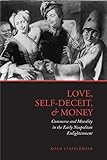Love, Self-Deceit and Money : Commerce and Morality in the Early Neapolitan Enlightenment / Koen Stapelbroek.
Material type: TextPublisher: Toronto : University of Toronto Press, [2008]Copyright date: ©2008Description: 1 online resource (272 p.)Content type:
TextPublisher: Toronto : University of Toronto Press, [2008]Copyright date: ©2008Description: 1 online resource (272 p.)Content type: - 9780802092885
- 9781442688537
- 945/.73034
- HN488.N3
- online - DeGruyter
| Item type | Current library | Call number | URL | Status | Notes | Barcode | |
|---|---|---|---|---|---|---|---|
 eBook
eBook
|
Biblioteca "Angelicum" Pont. Univ. S.Tommaso d'Aquino Nuvola online | online - DeGruyter (Browse shelf(Opens below)) | Online access | Not for loan (Accesso limitato) | Accesso per gli utenti autorizzati / Access for authorized users | (dgr)9781442688537 |
restricted access online access with authorization star
http://purl.org/coar/access_right/c_16ec
"Love drives and gives life to the commerce of mankind." Thus, the sixteen year old Ferdinando Galiani (1728-1787) presented his project to understand the sociable nature of man. This observation, a reflection of his own position on the relation between trade and virtue, hinted at what the mature works of Galiani, one of the most noteworthy economists and wits in eighteenth-century Italy, would eventually yield.In Love, Self-Deceit, and Money, Koen Stapelbroek reconstructs the Early Neapolitan Enlightenment debate on the morality of market societies, a debate that hinged on the preservation of Naples' independent statehood in a global arena of commercial and military competition. Galiani rejected the moralizing and mercantile ideas of his contemporaries regarding the dangers threatening Naples, and, in his Della moneta (1751), he justified the systems set in place by the Neapolitan government. With reference to early, previously unstudied lectures on self-deceptive 'Platonic love,' Koen Stapelbroek examines Galiani's role in the wider debate, arguing that his early moral philosophical and historical work suggests a great deal about his political-economic stance, including his assertion that money is the ultimate ordering principle in the universe.As a study of one of the most idiosyncratic minds of the Enlightenment period, Love, Self-Deceit, and Money shows how diverse ideas of the development of individual passions into social dispositions, commerce, and reform politics dovetailed seamlessly in the intellectual climate of eighteenth-century Europe.
Mode of access: Internet via World Wide Web.
In English.
Description based on online resource; title from PDF title page (publisher's Web site, viewed 01. Nov 2023)


